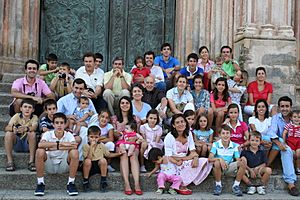Extended family facts for kids
An extended family is a type of family that includes more than just parents and their children. It often involves other relatives like grandparents, aunts, uncles, and cousins all living together or very close by. Sometimes, it can also mean married couples living with the parents of one of the spouses. Within an extended family, there are usually several immediate families (parents and their children) connected to each other.
A family with more than two adults is sometimes called a complex family. This includes extended families or families where there might be more than just one mother and one father, like in blended families.
Contents
What is an Extended Family?
An extended family goes beyond the typical "nuclear family" (which is just parents and their children). Imagine your family tree, but instead of just your immediate branch, you have many branches living together or sharing a strong connection. This can include:
- Grandparents: Your parents' parents.
- Aunts and Uncles: Your parents' brothers and sisters.
- Cousins: The children of your aunts and uncles.
These relatives might all live in the same house, in houses very close to each other, or in the same community, sharing daily life and responsibilities.
Why Do People Live in Extended Families?
There are many reasons why people choose to live in extended families, and these reasons can vary greatly across different cultures and parts of the world.
Sharing Support and Resources
Living in an extended family often means there are more people to help out. This can be very useful for:
- Childcare: Grandparents or aunts and uncles can help look after younger children, allowing parents to work or study.
- Elderly Care: Younger family members can care for older relatives who might need help with daily tasks.
- Financial Support: Family members can pool their money and resources, making it easier to afford housing, food, and other necessities. This can be especially helpful during tough economic times.
- Household Chores: With more adults, tasks like cooking, cleaning, and maintaining the home can be shared, reducing the burden on any one person.
Cultural Traditions and Values
In many cultures around the world, living in an extended family is a strong tradition. It helps to:
- Pass Down Knowledge: Older generations can share their wisdom, stories, and skills with younger family members.
- Preserve Culture: Family traditions, languages, and customs are often kept alive and passed down through generations within an extended family setting.
- Strengthen Bonds: Living together or very closely can create very strong emotional bonds and a deep sense of belonging among family members.
Safety and Security
Having more family members around can also provide a sense of safety and security. There are more people to look out for each other, especially in times of need or crisis. This strong family network can offer emotional comfort and practical help.
Benefits of Extended Families
Extended families offer many advantages that can enrich people's lives.
Stronger Social Connections
Living with a large family means you always have people around. This can help prevent loneliness and create a strong support system. You learn how to get along with different personalities and build close relationships with many relatives.
Learning and Guidance
Grandparents and older relatives often have a lot of life experience. They can offer valuable advice, teach important skills, and share stories that help younger family members learn about their family history and cultural heritage. This intergenerational learning is a huge benefit.
When many adults live together, responsibilities can be divided. This means less stress for any single person or couple. For example, one person might focus on cooking, another on gardening, and others on earning money.
Challenges of Extended Families
While there are many benefits, extended families can also face some challenges.
Privacy and Space
Living with many people in one home can sometimes mean less personal space and privacy. It's important for family members to respect each other's need for alone time.
Decision-Making
With more adults involved, making decisions can sometimes be complicated. It's important for families to have clear ways of communicating and making choices together, ensuring everyone feels heard.
Potential for Disagreements
Just like any group of people, family members can have different opinions or ideas. Learning to resolve conflicts respectfully and compromise is key to a happy extended family life.
Extended Families Around the World
Extended families are very common in many parts of the world, especially in Asia, Africa, Latin America, and the Middle East. In some countries, it's the most common way for families to live. In Western countries, nuclear families became more common, but extended families still exist and are valued by many. The way extended families live can vary, from everyone sharing one large house to living in separate homes on the same property or in the same neighborhood, but still sharing daily life and support.
See also
 In Spanish: Familia extensa para niños
In Spanish: Familia extensa para niños
 | Valerie Thomas |
 | Frederick McKinley Jones |
 | George Edward Alcorn Jr. |
 | Thomas Mensah |


